There are indeed people in New York who are interested in William T. Vollmann. On Thursday night, accompanied by Marydell, Levi, and Jason, I attended the Whitney Museum “Summer of Love” lecture featuring photographer Richard Drew — the man behind the Falling Man photos — and, of course, Vollmann. There, I also met a smart Pynchon enthusiast by the name of Christopher Byrd, a guy named Doug (a Barth fan who I met in the lobby), and another gentleman named Ralph, who apparently discovered The Vollmann Club while trying to find information on the man to teach a class. There was also another pleasant gentleman who reads this site, but whose name I sadly don’t recall. I was pleasantly surprised that my announcement drew a few WTV fans out of the closet who apparently recognized me and were kind enough to say hello.
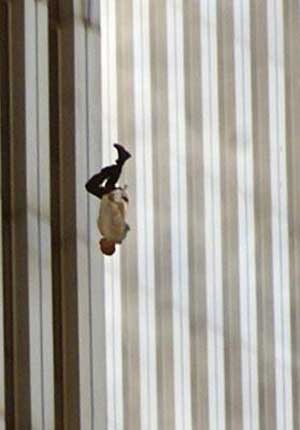 Despite the event’s title “Vision and Violence,” I was particularly surprised that nobody had mentioned the Abu Ghraib photos during the course of the conversation. But both Vollmann and photographer Richard Drew had interesting things to say about the role of photography, of which more anon.
Despite the event’s title “Vision and Violence,” I was particularly surprised that nobody had mentioned the Abu Ghraib photos during the course of the conversation. But both Vollmann and photographer Richard Drew had interesting things to say about the role of photography, of which more anon.
The moderator, whose name I neglected to jot down in my notes because of an unexpected shift in lighting that startled me, was a regrettably stiff gentleman who worked for The New Yorker. I feel that I can sufficiently call him stiff because, when Vollmann read a stirring passage (“The White Knights”) from The Rainbow Stories, the moderator stared at Vollmann the entire time, craning his neck like an affluent ostrich ensnared in the unexpected Swedish cold. I know that he was doing his best and was no doubt apprised by someone that discussing violence was a serious business. Nevertheless, it was a bit awkward to see the moderator, Vollmann, and Drew crammed around a small table on stage right, so that the same twenty-five photographic images — John Filo’s Kent State photo, Nick Út’s Vietnam napalm girl, Eddie Adams’s execution photo, et al. — could be projected on a large screen in front of the audience. But the talk itself was interesting, with Drew even becoming defensive near the end.
The moderator began by asking what the two men were doing during the Summer of Love. Vollmann replied that he was not even a teenager, but said that he remembered his mother driving him home from school, when Kennedy was assassinated. His mother was crying and couldn’t stand this news. The young Vollmann looked to the other cars and saw that other people were crying.
“How do you find your subject matter?” asked the moderator. (This was a sampling of the generalized questions he had at his disposal.) Drew indicated that his daily assignments are determined on a minute-by-minute basis. Recently, he had taken photos of “the girl from Harry Potter on the Today Show,” as well as a 280 point jump at the New York Stock Exchange. Vollmann said that his subject matter came from a desire to understand, learn, and help others. He remarked upon how the 1979 Soviet invasion of Afghanistan had upset him, particularly when it started disappearing from the newspapers. His desire to help became “more attenuated.” Vollmann said that in all journalistic capacities, he wanted to give something to the people he met. In 1992 Sarajevo, Vollmann said that he “wanted understanding of who was more wrong.”
Upon Vollmann’s response, Drew became a bit rankled with this journalistic notion of helping people. “I’m not the Red Cross!” he insisted, shortly after declaring that he “records history every day.” Drew declared that there’s nothing political in what he does. And while one might argue that there may not be much of a political stake in photographing “the girl from Harry Potter” (I’m certain that future historians will be looking back at a Today Show publicity junket when chronicling the important moments of our time), are not Drew’s Falling Man photos political in some sense? Drew later mentioned that some newspapers thought it inappropriate to publish these photos. He also observed that this Channel 4 documentary (full one hour, eleven minute YouTube link) examining the subject of whether the photos were appropriate had not yet aired in the States. During the Q&A session that came later, Drew was adamant that he was not pushed around or pressured to shoot particular photos as an AP photographer. But surely a man with 37 years in the business understands that the decisions of editors and publishers to prioritize lionized firemen over a man plunging to his death from the Twin Towers is certainly political in nature. Without discounting Drew’s artistry as a photographer, surely a man who knows what photos are going to sell is more likely to tilt his lens in a certain direction if it will make ends meet. (Drew later confessed that, despite accepting nearly every assignment that came to him, he elected not to go to Iraq between the two wars because he had a kid on the way. It’s worth noting that Vollmann has continued to travel to faraway locales despite having a family to support, although, unlike Drew, he did not mention his family.)
Vollmann pointed out that he tried not to judge people — “at least not too early.” He offered a novelist’s comparison between flat and round characters, and pointed out distinction between understanding and telling, using an example of Muslims who had never heard of the Holocaust and couldn’t believe that it was true.
In response to the moderator’s question of whether the two men had observed the world becoming a more dangerous place, Drew again divested himself of politics, observing, “You don’t have to choose a side. You just have to be in the right place at the right time.” Vollmann didn’t think the world had become any more dangerous. But when the talk shifted to assignments, he pointed out that his only criteria in turning something down was (1) the publication not paying him enough and (2) whether his work is going to be helpful and worth the risk. Vollmann stated that if he were to go to Iraq today, he would have to think about it. “What good would it do? Would I have anything new to contribute?”
Concerning photography, Vollmann pointed out that he relied on Comtex cameras when going to a war zone because the lenses are very sharp and durable. For situations that are less dangerous, he relied on an 810. The photographs that Vollmann takes often allow his readers to get another sense of a person, such as some of the subjects that Vollmann included in Poor People.
Drew noted that photos tell the story and that he doesn’t have the luxury of 10,00 words. He had only one picture. The moderator noted that the Falling Man photos were “formally beautiful,” and in referring to his Falling Man photos, Drew pointed out that he had not experienced nearly as much controversy when he published his Kennedy photos.
Vollmann said that he didn’t face much in the way of restrictions. “A lot of people don’t read. So I don’t have too many problems.” He then referred to his Bosnia experience, when two friends of his were killed in a jeep. He said that he had the right and the duty to publish something, but that he didn’t want to publish pictures of their dead faces. He didn’t feel this ws right. Nevertheless, Vollmann said, “The job of the reporter is to show conflict, to show suffering.” So while in the back seat, he grabbed his notebook and started writing. Drew grew visibly uneasy over this and Vollmann simply responded, “They were already dead.” He pointed out that had that not been the case, he would have helped them.
Despite Drew’s quibbles over Vollmann’s personal concern for his subjects, Drew nevertheless pointed out that he would carry on taking photos without obtaining the permission of his subjects. Drew said that his motto was Shoot first, ask questions later. “I have to capture reality as it happens.”
Perhaps observing Drew’s growing discomfort, Vollmann then said that he doesn’t necessarily believe that Drew’s approach is wrong, but that his own approach involves “wanting to understand a person or event over time.” He said that it was important to earn the trust of his subjects. If he knew the subject, then he was more inclined to ask their permission. But when it come to depicting naked violence — such as an extreme Serbian nationalist shooting someone — “some of the rules don’t apply.”
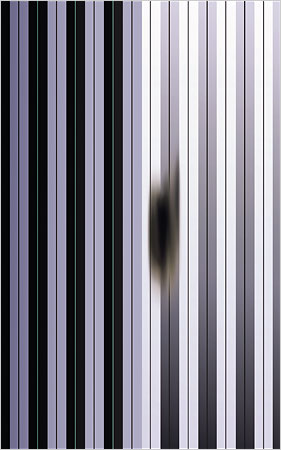 The moderator then asked another regrettably general question: “What made you want to do what you want to do?” Vollmann said that he hopes that he can document moments in time. Drew pointed out that his photography started off as a hobby. When in college, a street sweeper had overturned. He took photos and, upon getting an offer for $5 for the picture or a free roll of film and a photo credit, he chose the latter. He then became a freelance photographer, constantly listening to the police scanner. Today, with digital demand, Drew said that “the beast has become more insatiable.”
The moderator then asked another regrettably general question: “What made you want to do what you want to do?” Vollmann said that he hopes that he can document moments in time. Drew pointed out that his photography started off as a hobby. When in college, a street sweeper had overturned. He took photos and, upon getting an offer for $5 for the picture or a free roll of film and a photo credit, he chose the latter. He then became a freelance photographer, constantly listening to the police scanner. Today, with digital demand, Drew said that “the beast has become more insatiable.”
Vollmann pointed out, “As the beast becomes more insatiable, it’s for more and more types of meat in smaller bytes.” He said that he was more inclined to write books and less inclined to write magazine pieces, because there was no longer the demand for 20,000 word stories, as there was in the ’90’s. But he also observed, “If your heart is really in something, no one’s going to stop you.”
When Don DeLillo’s Falling Man was brought up, Drew offered a remarkable story. When DeLillo’s book was reviewed in the NYTBR, the review came with an accompanying graphic for the cover. Without accreditation to Drew, it seems that Sam Tanenhaus’s team not only stole Drew’s image for the cover, but egregiously smudged out the figure of the man (see above image to left). Drew was understandably upset about this, simply asking for “credit where credit is due.” And it makes one wonder how many other images have been appropriated by Tanenhaus’s team without credit.
[UPDATE: Jason has a brief writeup, which also references the conversation that Vollmann and a good cluster of us had afterwards.]
[UPDATE 2: Marydell also has a report up.]

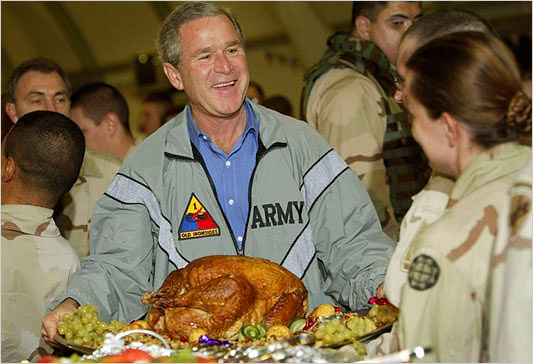
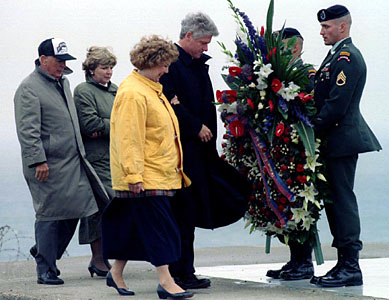 The shop was owned by a quiet, portly and agreeable man with thinning sandy hair, egg-shaped spectacles working wonders accentuating his two thin horizontal slats into an owl-like visage, and a bristling moustache. He was a friendly guy, fond of chatting with the post-teen, pre-college transfer hired help. He outsourced desperate young plebeians like me for low wages to perform mind-numbing tasks that he wouldn’t dare perform himself: in my case, collating thousands of high school newspapers and bland user documentation put out by fledgling startups.
The shop was owned by a quiet, portly and agreeable man with thinning sandy hair, egg-shaped spectacles working wonders accentuating his two thin horizontal slats into an owl-like visage, and a bristling moustache. He was a friendly guy, fond of chatting with the post-teen, pre-college transfer hired help. He outsourced desperate young plebeians like me for low wages to perform mind-numbing tasks that he wouldn’t dare perform himself: in my case, collating thousands of high school newspapers and bland user documentation put out by fledgling startups. 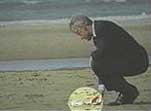 But one day, Limbaugh eventually revealed his colors. On June 6, 1994, Clinton was in Europe to recognize the 50th anniversary of Normandy. And like any President, he staged the predictable photo ops. Clinton gave a speech. He walked lone along the beach of Normandy, preparing a cairn. Hardly surprising. All politicians are forced to embrace artificiality at some point. It’s only the most gifted politician who can make every moment feel natural.
But one day, Limbaugh eventually revealed his colors. On June 6, 1994, Clinton was in Europe to recognize the 50th anniversary of Normandy. And like any President, he staged the predictable photo ops. Clinton gave a speech. He walked lone along the beach of Normandy, preparing a cairn. Hardly surprising. All politicians are forced to embrace artificiality at some point. It’s only the most gifted politician who can make every moment feel natural. 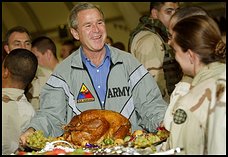 Which makes the recent Washington Post news that
Which makes the recent Washington Post news that